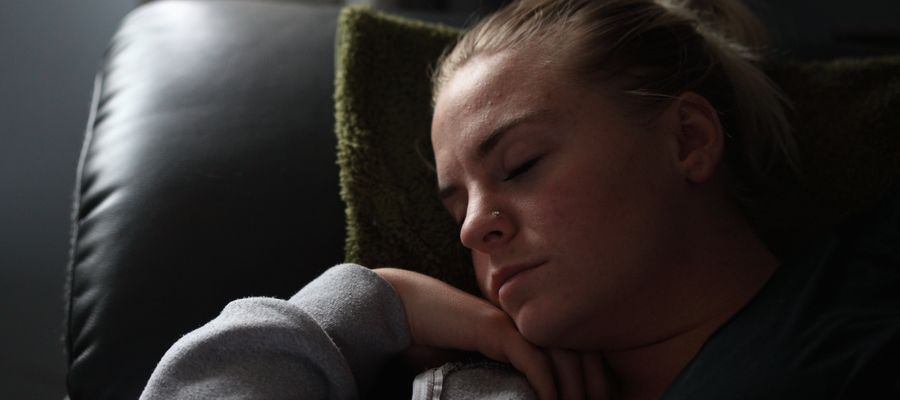How to Sleep Better at Night: Sleep Hygiene Tips
Tired of tossing and turning all night? Well, time to focus on your sleep hygiene.
A good night’s rest will not just improve your physical health--you will also begin to feel mentally refreshed. Fall short and it will take a toll on your emotional balance, energy levels, productivity, and even weight.
But don’t worry. While you cannot control all the factors that interfere with your sleep, you sure can adopt some habits to help you sleep better at night.
Get in sync with your body’s circadian rhythm, craft a pre-bed routine, cultivate pro-sleep habits, and create a sleep-inducing environment. These simple steps will signal to your mind that bedtime is approaching.
In this article, we’ll talk about essential sleep hygiene tips. We also have a list of smart eating and drinking habits you can adopt to sleep better. Plus, you’ll find out what you can do if you still can’t fall asleep.
So, how to sleep better?
How to Get a Better Sleep
An unhealthy lifestyle and daytime habits can interfere with your sleep. Poor sleep will leave you in a bad mood, to say nothing of your physical and mental health.
But all’s not lost. Take a note of these sleep tips and implement them little by little. You will soon start to feel a great improvement in your sleep quality.
Keep in Sync with Your Circadian Rhythm
The circadian rhythm is your body’s natural sleep-wake cycle. Think of it as an internal clock that helps determine when you fall asleep and wake up.
Here are a few things you can do to get in sync with your circadian rhythm.
Set a Fixed Wake-Up and Sleep Time
Try to sleep and rise at the same time daily. Stick with this routine even on weekends when you are otherwise tempted to pull an all-nighter or sleep in.
This will help set your body’s internal clock. Your sleep quality will improve, and you will wake up naturally without an alarm clock.
Limit Your Daytime Naps
Taking a nap is a good way to make up for lost sleep. But if you nap for too long in the day, you will find it hard to fall asleep at night.
Better avoid sleeping during the day. If you must, take a quick nap of no more than 20 minutes shortly after lunch.
Make Gradual Adjustments
If you’re a night-owl waiting for an early-bird metamorphosis, be patient. Adjust your sleep schedule little by little.
Start going to sleep 1 or 2 hours earlier every night. This will give your body time to adjust to the new schedule.
Craft a Pre-Bed Routine
Residual stress and anger from your day can make it hard to fall asleep. Even bright lights before bedtime and exposure to electronic devices can disrupt your circadian rhythm.
Craft and stick to some pre-bed habits. These will help you get a restful sleep.
Clear Your Head
Wind down at least 30 minutes before bedtime. This will calm your mind and make it easier for you to drift off to sleep.
During this time, you can do some light reading, listen to soft music, or play an audiobook. You can even take a warm and relaxing bath.
Lower the Lights
Avoid exposure to bright, white light at night. It may trick your brain into thinking it’s daytime.
Dim your lights, use warm light tones, and draw heavy curtains to block all light from outside.
Disconnect from Devices
You may be tempted to check your social media before sleeping, just to catch up with the latest posts. But the blue light of your phone, tablet, or laptop is disruptive.
What’s worse, using your devices will send your brain the message to remain active.
Cultivate Pro-Sleep Habits
Your daytime habits are as important as your pre-bed rituals for a restful sleep. Start by exercising regularly and focusing on your eating habits.
You may also want to understand how light affects your sleep and how you can control it.
Exercise During the Day
Regular exercise is key to a deep, restorative sleep. But if you’re a fitness newbie, don’t jump straight into high-intensity training.
Start with something light— stretching, yoga, or a morning walk. Avoid working out before bedtime as it may keep you active for longer than you want.

Control Your Exposure to Light
Exposure to sunlight during the day will improve your energy levels. It will also increase your sleep efficiency by 80%.
Exposure to light before bedtime has the opposite effect. It will decrease the production of melatonin, a hormone that aids sleep.
Don’t Eat Too Late
Set your dinnertime for earlier in the evening. If you dine too late, your body will still be digesting the food, making it hard for you to fall asleep.
You should also avoid eating fatty and spicy foods for dinner. Instead, opt for a light salad or soup.
Create a Restful Environment
Turn your bedroom into a peaceful, sleep-inducing haven. Optimize your room temperature, embrace quietude, and use comfortable bedding.
Even a few small changes to your sleeping environment can greatly improve the quality of your sleep.
Set Your Bedroom Temperature
You don’t want your room to feel too hot or too cold in the middle of the night. Set a temperature you’re comfortable with beforehand.
The ideal room temperature for most people is around 65°F or 18°C. See if it works for you, too.
Keep the Noise Down
Your brain will start feeling sleepy if your environment gets quieter. So, make sure to keep the TV or music volume down at night.
If you have loud neighbours or you live just across a busy street, mask the noise with a fan or white sound machine. You can also use a pair of earplugs to block the noise.
Choose a Quality Mattress and Bedding
A quality mattress will make sure you are comfortable enough to fall asleep. It will also give your spine proper support to avoid backaches.
Your bedding should be comfortable, too. You should have enough room to stretch and turn over comfortably without getting all tangled.

Smart Eating and Drinking Habits to Sleep Better
Your eating and drinking habits also play a role in how to sleep better. While sugar and refined carbs can trigger wakefulness at night, a vegetable and fruit-rich diet will improve your sleep quality.
Take a look at these smart eating and drinking habits.
- Start your day with a breakfast rich in nutrients. Add more fruits and vegetables to your diet.
- Limit your caffeine intake. Cold drinks, coffee, and sodas are stimulants that can disrupt your sleep.
- Cut back on easy-to-make foods like pasta and flavoured rice. These are packed with refined carbs and sugars that can trigger sleeplessness.
- Avoid drinking alcoholic beverages at night. While a nightcap may help you relax, it will disrupt your sleep cycle and lower your sleep quality. Regular alcohol consumption contributes to dry eyes and other eye conditions.
- You may also want to quit smoking, or at best, avoid it before bedtime. Smoking can cause fragmented sleep which can further interfere with your waking functions.
- Don’t eat a heavy dinner. Make something light and easy to digest. A heavy dinner will mean your digestive system is still at work while you try to fall asleep.
What to Do If You Can’t Fall Asleep
It’s normal to wake up briefly at night. But do you find it hard to drift off to sleep again? Or are you unable to fall asleep in the first place?
Here are some more sleep hygiene tips to help you.
Try to Relax
Make relaxation your goal instead of sleep. Relax your muscles, control your breathing, and loosen your clothing.
You can also try the body scan meditation technique to fall back asleep. Start focusing on the way different parts of your body feel. For example, think of your toes, or calves, and imagine each deep breath flowing to that body part.
Get Out of Bed
If you have been awake for more than 20 minutes, get out of bed. Do a quiet, relaxing activity in low light.
You can read a book, go through a magazine, or listen to soothing music. Avoid checking the time, as that may increase anxiety about lost sleep.
Keep a Sleep Journal
The Sleep Foundation recommends keeping a sleep journal. Use it to record everyday sleep-related information. Note down your lights-out and wake-up time, how long it takes to fall asleep, number of sleep interruptions, and so on.
These records will help you understand what’s hurting your sleep and what’s working best for you. Make changes accordingly.
Stay Out of Your Head
If you wake up in the middle of the night, avoid stressing over your inability to fall back asleep. Stay out of your head and focus on your breathing instead.
If your interrupted sleep is the result of worry, make a quick note of it and postpone thinking about it until morning.
Talk With a Doctor
If you still find it difficult to fall asleep, contact your doctor. They will offer you professional help by identifying the causes that trouble your sleep.
Your doctor will ask about your symptoms, medical history, and lifestyle. They will also give you a full physical examination. Based on these, they will begin your treatment and help you get the proper sleep you deserve.
Sleeping to Good Health
Sleeping well at night means not yawning the next day away. But do you know a good night’s sleep has many health benefits, too?
You will find a great shift in your productivity and concentration levels if you are well-rested. It will lower your risk of heart diseases, prevent depression, and boost your immune system.
Sleep is also crucial for keeping your eyes healthy. The American Academy of Sleep Medicine warns that people with poor sleep are more likely to develop eye health problems.
What’s more, you will feel more energized during the day and also up your social interaction skills.
But how much sleep do I need, you may ask? The answer depends on your age. Toddlers and preschoolers need over 12 hours of sleep. For young kids, it is 9 to 12 hours. Finally, youngsters and adults require at least 8 hours of sleep.
So, sleep your way to good health by focusing on sleep hygiene.
